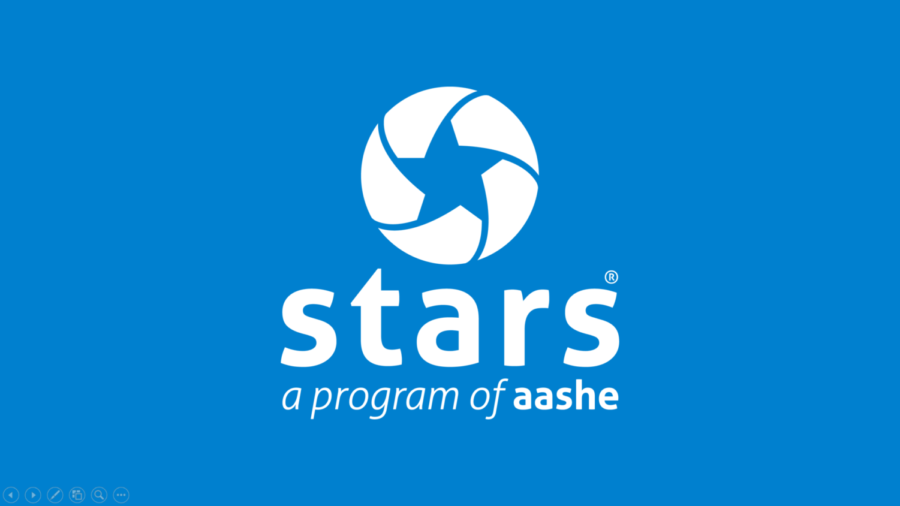A sustainability group that gives priority to action
NKU's first Sustainability Engagement & Action Group met for the first time on Jan. 27
February 16, 2022
A PowerPoint presentation slide at SEAG’s first meeting. The group is focusing on completing AASHE’s STARS report for its first project.
From a discussion on having more sustainability-themed movie nights on campus, came a group that seeks to unite multiple disciplines into completing sustainability projects. Northern Kentucky University’s first Sustainability Engagement & Action Group (SEAG) held their inaugural meeting over Zoom on Jan. 27.
“We as a university do not have much focus on incorporating sustainability into our overall values and initiatives. So this group will hopefully bring people together at all levels to have all voices at the table, creating action around sustainability-related projects,” said Tiffany Budd, NKU’s Sustainability Action Coordinator, at the meeting.
SEAG aims to differentiate itself from other sustainability groups on campus – citing the Environmentally Concerned Organization of Students (ECOS) and Northern Kentucky Sunrise – through a focus on realizable action.
“Explaining what sustainability is, what we’re doing on campus related to sustainability, having some guest speakers… All very important educational, informative stuff, but not really action-based,” Budd said. “So the point of this group is to be more action-based, not so much on the presentation side of things – even though there will be some of that to an extent as we get together.”
The group consists of four core members: Budd, Director of Environmental Science Dr. Kristine Hopfensperger, Dr. Allison Parker and Dr. Rhonda Davis, who came together last year to discuss options for more sustainability activities on campus, such as movie nights and discussion events.
According to Budd, the conversation then pivoted to forming an official sustainability action group that could complete more impactful sustainability-related projects while bringing together people across all levels and disciplines at NKU. Students, faculty, staff and administrators are welcome to join the group, regardless of specialization and expertise.
“I am the sole designated sustainability professional at NKU and I’m limited on how much I, one person, can accomplish,” Budd wrote in a follow-up email to the meeting, “so this group is vital to helping advance sustainability on campus at the level needed to make a more significant impact.” She added that the group also formed as a response to student inquiries for more support and action around sustainability at NKU.
“It takes some leadership to put groups like this together,” said Dr. Dale Stephenson, dean of the College of Health and Human Services, who attended the Jan. 27 meeting. “These kinds of groups oftentimes don’t get the support that they need.”
At the first meeting, SEAG voted to change its name from Sustainability Action Group (SAG) to avoid being mistaken with other organizations that are already using the acronym. The group also introduced its first project: the Sustainability Tracking, Assessment & Rating System (STARS) report by the Association for the Advancement of Sustainability in Higher Education (AASHE), which sets global sustainability standards for colleges and universities.
STARS offers credits in five categories: Academics (curriculum and research), Engagement (student life and community partnerships), Operations (building and transport infrastructure, dining, facilities), Planning & Administration (coordination, investment, diversity, wellness), Innovation & Leadership.
Participating institutions pick the credits they aim to pursue, for which they will collect sustainability information from campus stakeholders in the pertinent fields. After finalizing their credits, they will submit their report to AASHE staff, who will review the report and give the institution points according to a benchmark. The number of points will go toward five levels of recognition: Reporter, Bronze (minimum of 25 points), Silver (45 points), Gold (65 points), Platinum (85 points).
According to SEAG, the STARS report will serve as a baseline for sustainability initiatives at NKU, help the university figure out what it is lacking in which areas, and help incorporate sustainability into its strategies, goals and initiatives.
SEAG encouraged group members to help one another finish the questions within their categories, adding that the project is a good opportunity for students to get involved with university research, learn more about the university and get more connected with other offices.
“We are an open, flexible group: you can participate as much or as little as you like,” Budd said. “We hope that you come here to participate. All we ask is that if you do commit to helping with the project, please be active with it.”
Aside from the STARS report, SEAG is open to suggestions for any sustainability activities or initiatives from any member. At the meeting they discussed a beekeeping initiative first brought up by Stephenson.
Honeybees swarm in the spring when they make a new queen or when they move with their queen, and they often find themselves in human houses and backyards, Stephenson said. He encouraged those who spot a swarm to contact their local beekeeping society, who could properly relocate it to a new hive, instead of calling pest control who will eliminate the bees. The initiative received positive response from other attendants. SEAG hoped that members would continue to bring up similar ideas.
The next SEAG meeting will be held on Feb. 18 and will focus on completing category questions for the STARS report. For more information, visit the SEAG webpage or contact Tiffany Budd at buddt1@nku.edu.
Correction: This article previously stated that Dale Stephenson encouraged those who spot a honeybee swarm to transfer it to a new hive. This can cause harm to the individuals who try to move the bees themselves. The correct method for dealing with swarms has been added.

